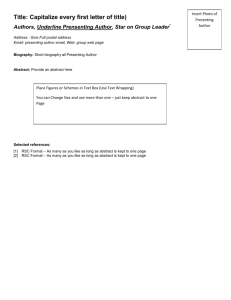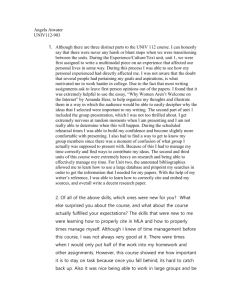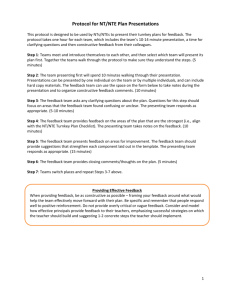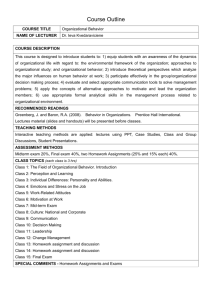Presenting Banks in French Tender Offers
advertisement
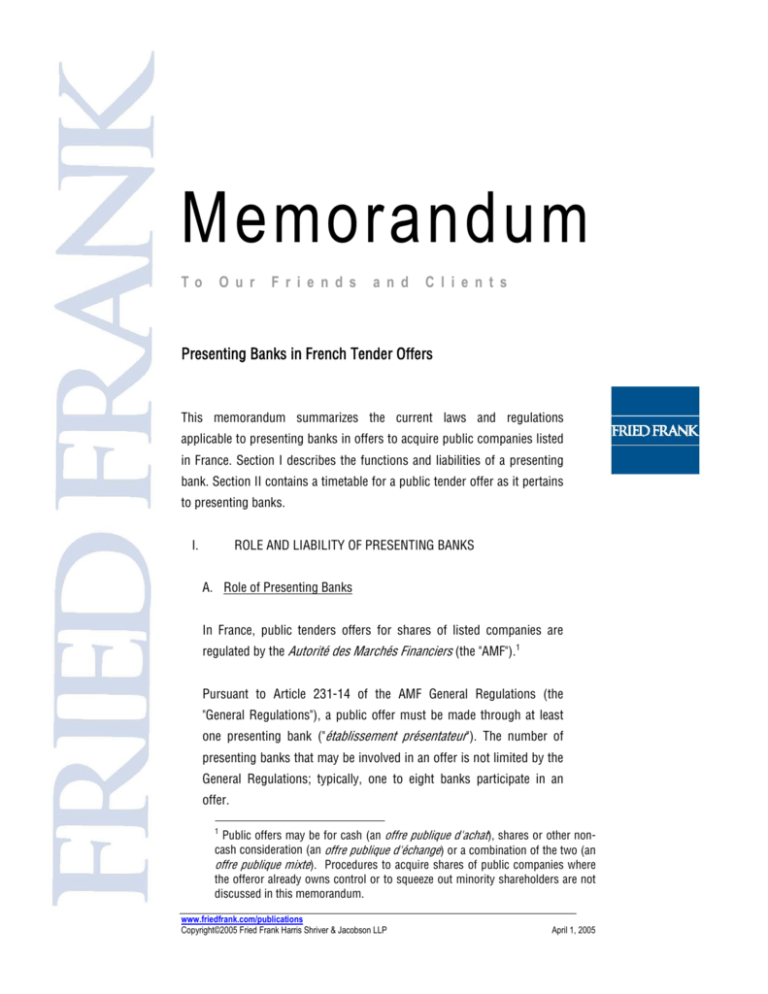
Memorandum To O u r F r i e n d s a n d C l i e n t s Presenting Banks in French Tender Offers This memorandum summarizes the current laws and regulations applicable to presenting banks in offers to acquire public companies listed in France. Section I describes the functions and liabilities of a presenting bank. Section II contains a timetable for a public tender offer as it pertains to presenting banks. I. ROLE AND LIABILITY OF PRESENTING BANKS A. Role of Presenting Banks In France, public tenders offers for shares of listed companies are regulated by the Autorité des Marchés Financiers (the "AMF").1 Pursuant to Article 231-14 of the AMF General Regulations (the "General Regulations"), a public offer must be made through at least one presenting bank ("établissement présentateur"). The number of presenting banks that may be involved in an offer is not limited by the General Regulations; typically, one to eight banks participate in an offer. 1 Public offers may be for cash (an offre publique d'achat), shares or other noncash consideration (an offre publique d'échange) or a combination of the two (an offre publique mixte). Procedures to acquire shares of public companies where the offeror already owns control or to squeeze out minority shareholders are not discussed in this memorandum. www.friedfrank.com/publications Copyright©2005 Fried Frank Harris Shriver & Jacobson LLP April 1, 2005 The primary role of the presenting bank is to guarantee the obligations of the offeror pursuant to the offer. The presenting bank also prepares the tender offer documents and the offering prospectus (note d'information) presented to the AMF and acts as an intermediary between the offeror and the AMF throughout the offering process. From a legal perspective, the presenting bank is the agent of the offeror visà-vis the stock exchange authorities. This relationship is typically formalized by an engagement letter specifically setting out the presenting bank's role and liability. B. Authorization to Act as a Presenting Bank Pursuant to Article 231-14 of the General Regulations, a presenting bank must be an investment services provider authorized in France to engage in firm price underwritings of securities offered to the public. This authorization is based on a number of criteria, including compliance with certain minimum capital rules and capital adequacy ratios. A list of authorized presenting banks is published every year in the Journal Officiel by the Comité des Etablissements de Crédit et des Entreprises d'Investissement. C. Presenting Bank Guarantee A public offer becomes irrevocable upon the filing with the AMF of the offering documents,2 and remains irrevocable throughout the offering period. An offeror cannot withdraw its offer prior to the closing date unless a counteroffer is made or the target company takes certain defensive measures in response to the offer (e.g., selling material assets or issuing additional securities to third parties). If the target takes defensive measures, the offeror must obtain the approval of the AMF in order to withdraw its offer. The tender offer documents do not become officially active until they are approved by the AMF, but the offer becomes irrevocable when the proposed offering documents are filed. 2 Fried, Frank, Harris, Shriver & Jacobson LLP A Delaware Limited Liability Partnership Client Memorandum April 1, 2005 2 Pursuant to Article 231-14 of the General Regulations, the presenting bank guarantees the offeror’s undertakings with respect to the offer. The terms of this guarantee are set forth in a letter executed by at least one of the presenting banks and delivered to the AMF at the time the tender offer documents are filed. The presenting bank's guarantee is subject to the conditions of the offer itself, which are limited under French law to (i) receipt of certain regulatory approvals, including antitrust clearance;3 (ii) acquisition of a specified minimum number of shares, voting rights or percentage of the target's capital; and (iii) satisfaction of the conditions of any other tender offer launched simultaneously by the same bidder.4 In a cash offer, if the offeror fails to pay for the shares tendered pursuant to the offer, the presenting bank becomes obligated to purchase the shares. A presenting bank's guarantee also extends to deferred payments to the target company's shareholders pursuant to a bond, a certificat de valeur garantie, a warrant or similar security. In the case of an exchange offer for shares or other securities, the presenting bank could be held liable for financial damages if the offeror fails to issue the securities offered. To date, no presenting bank guarantee has ever been called.5 The extent of a presenting bank's liability under the guarantee therefore remains uncertain under French law. Some French doctrinal authors believe that the presenting bank's guarantee is analogous to a contrat de cautionnement, a form of guarantee in which claimants must first pursue a claim against the original obligor prior to seeking relief from the guarantor. By this view, if the offeror Article 231-12 of the General Regulations. Pursuant to Article 231-11 of the General Regulations, "In the event that a single offeror files offers for different target companies, the offeror may condition its decision to proceed with one of these offers upon achievement of the threshold for purchase of shares or voting rights is stipulated in the other offer or offers. During the offer period, the offeror may waive this condition, including in the event that a competing offer is made for one of the target companies." 5 On September 11, 1978, the Commercial Court of Paris dismissed an action brought by a minority shareholder of Société Française des Supermarchés against Crédit Commercial de France, the presenting bank for an offer made by Société des Docks Rénois (D. 1979, IR. 364, note Mr. Vasseur). The court found that under the previous 1970 regime, applicable at that time, the liability of a presenting bank was limited to a guarantee of the solvency of the offeror, and did not extend to the content of the note d'information, which was at issue in that case. 3 4 Fried, Frank, Harris, Shriver & Jacobson LLP A Delaware Limited Liability Partnership Client Memorandum April 1, 2005 3 were to default, the tendering shareholders would be required to first claim damages from the offeror before requesting payment from the presenting bank. Other doctrinal authors believe that the presenting bank's guarantee is autonomous and independent from the obligations of the offeror. Were this to be the case, the presenting bank would be directly liable to tendering shareholders, and no prior action against the offeror would be required. A French court could also view the presenting bank's guarantee as sui generis under French law. Because of the uncertainty regarding ownership of tendered shares in the event that the offeror defaults and the presenting bank is obligated to pay for them, we consider it appropriate to ask the offeror to provide a letter of credit, a pledge of acquired shares, or other collateral to secure the presenting bank's guarantee obligations. However, offerors generally resist giving any form of collateral other than a pledge over the shares to be acquired. Where more than one presenting bank is involved in an offer, all such banks are jointly liable for the obligations under the guarantee, although in the past the AMF has accepted that the guarantee liability be borne in its entirety by only one of the presenting banks in a presenting group. It is common practice for the participating banks to enter into a contribution agreement in order to apportion the potential liability. D. Prospectus Liability Pursuant to Article 231-20 of the General Regulations, the tender offer documents must include a statement by the presenting banks certifying "the accuracy of the information relating to the presentation of the offer and to the evaluation elements of the proposed price or exchange ratio." Fried, Frank, Harris, Shriver & Jacobson LLP A Delaware Limited Liability Partnership Client Memorandum April 1, 2005 4 The term "information relating to the presentation of the offer" is not directly defined by Article 231-20.6 Based on the previous regulations,7 this term should be interpreted broadly and should include the following information: - the number of securities sought to be purchased and, in the case of an alternative public offer or in the case of a principal offer with a subsidiary option, the number of securities sought in the cash portion of the tender offer and the number of securities sought in the exchange offer; - the nature of the securities sought; - the date of the transfer of title to the securities; - the indicative calendar for the offer; - in the case of a share exchange offer, the date of negotiability of the securities provided in exchange ("règlement-livraison") and the date anticipated for their admission to quotation, or in the case of a cash offer, the date of payment for the securities; - the mechanisms for carrying out the offer; and - the tax regime for the offer, distinguishing between the French regime applicable to individuals domiciled in France, legal persons subject to corporate tax in France, non-residents, and holders of purchase options or subscription options reserved for employees or corporate officers in the context of the offer. 6 Article 231-20 provides, among other requirements, that the note d'information must include the following information: (i) the identity of the offeror and a description thereof; (ii) accounting and financial information of the offeror; (iii) the offeror's intentions for at least the following twelve months, with respect to its labor, financial and industrial policies and with respect to the listing of the securities of the target company; (iv) the nature of the offer, including (a) the price or the exchange ratio and the manner in which determined, (b) the number of shares that the offeror undertakes to acquire, (c) the number of shares tendered in the offer below which the offeror will revoke the offer, (d) the number and type of shares, if any, already held by the offeror in the target company, and (e) the terms and conditions of the funding of the tender offer and its impact on the assets, business and results of the companies concerned by the offer; (v) the agreements relating to the offer to which the offeror is a party or of which it is aware and information concerning the persons acting in concert with the offeror; and (vi) if need be, the reasoned opinion of the board of the offeror on the interest of the tender offer or its consequences for the offeror, its shareholders and its employees and the conditions under which the reasoned opinion was adopted, dissenting members being named and their position indicated. The offeror also indicates its intent in terms of employment in the target company. 7 Commission d’opérations de bourse, Instruction of May 2002, applying Regulation No. 2002-04, as amended. Fried, Frank, Harris, Shriver & Jacobson LLP A Delaware Limited Liability Partnership Client Memorandum April 1, 2005 5 The required description of the price evaluation elements involves a detailed explanation of the proposed price or exchange ratio, including any implied premiums or discounts, using at least three standard valuation methods, e.g., market price, dividend history, net profits per share, net assets per share, and market comparisons. The legal nature of the presenting bank’s guarantee as regards the contents of the tender offer documents has not yet been clarified by case law or by the AMF. Presenting banks would certainly face liability for negligence, but would not be likely to be held strictly liable for errors or misstatements in the tender offer documents.8 A plaintiff shareholder would be required to prove that the presenting bank did not undertake requisite due diligence. E. Impact on Banking Ratios Under regulations promulgated by the Comité de la Réglementation bancaire et financière, the guarantee provided by a presenting bank is taken into account at the following rates in determining its impact on the presenting bank's solvency and "substantial risk" ratios: 20% for a cash tender offer, 0% for an exchange offer for shares, and 50% for the cash portion (soulte) of a mixed tender offer. With respect to the presenting bank's liquidity ratio, 5% of the guaranteed amount is typically taken into account. In practice, prospective presenting banks negotiate with the French banking authorities in advance to determine the impact of the guarantee on their banking ratios, both as to the maximum amount of exposure (taking into account the entire amount of the guarantee, or only a proportion as determined by the division of liability between the different banks) and the percentage of such amount to be included in the above ratios. Noncompliance by a presenting bank with obligatory ratios can result in sanctions by the Commission bancaire or the AMF, ranging from a simple reprimand to withdrawal of the presenting bank's banking license. 8 The debate during the public consultation relating to reform of the tender offer regulations in 2002 focused on the necessity of imposing an obligation of due diligence on the presenting banks. The General Regulations remain silent on this point. In contrast, pursuant to Article 212-4-3 of the General Regulations, the AMF has reserved due diligence requirements for investment services providers who participate in a market transaction, including an initial listing or a public offering. Fried, Frank, Harris, Shriver & Jacobson LLP A Delaware Limited Liability Partnership Client Memorandum April 1, 2005 6 In offers where there is more than one presenting bank, a contribution agreement entered into by all the banks is useful to convince the banking authorities that the total amount of the guarantee should be apportioned among the different banks for purposes of determining each bank's adequacy and liquidity ratios. F. Trading Restrictions and Reporting Requirements Prior to the filing of a public offer, trading by a presenting bank in securities of the offeror or the target company, whether for its own account or for the account of its clients, is subject to compliance with Chinese-wall procedures. A presenting bank may only carry out transactions in the shares of an issuer which it is assisting with an offer if such operations (i) are performed in the ordinary course of business; (ii) do not involve the use of nonpublic information, and (iii) are carried out by personnel having different means, objectives and responsibilities than the personnel involved in the public offer. Pursuant to Article 321-99 of the General Regulations, the offeror’s contact person at the presenting bank must notify the bank's déontologue (ethics officer) once they consider an offer to be sufficiently likely to occur that a potential conflict of interest may arise or a misuse of nonpublic information may occur. The déontologue is required to fulfill certain supervisory and record-keeping obligations in order to ensure that such conflict or misuse is avoided, and to permit the AMF to monitor the trades made by the presenting bank in the securities concerned. Once the offer is filed, a presenting bank can continue to make trades for clients (other than the offeror), subject to continued compliance with Chinese-wall procedures. With respect to trades for its own account, a presenting bank must comply with the same trading restrictions as those applicable to the offeror. In a share exchange offer, a presenting bank may not trade in the shares of the target company or the shares to be exchanged for the target company's shares. In a cash offer, the presenting bank is free to acquire shares of the target company, unless the offeror has reserved the Fried, Frank, Harris, Shriver & Jacobson LLP A Delaware Limited Liability Partnership Client Memorandum April 1, 2005 7 right to abandon the offer if a stipulated threshold of share ownership is not achieved through the offer. If the presenting bank purchases shares on the market at a price above the tender offer price, the offering price is automatically increased to the higher of (i) 102% of the offer price, or (ii) the price of the shares purchased by the bank. Following the filing of the public offer, a presenting bank may conduct trades for its own account that would normally be subject to the restrictions discussed above. However, such transactions are only permissible in the cases of: (i) arbitrage; (ii) market-making; and (iii) covering existing positions in the securities concerned. Arbitrage for purposes of this exception includes transactions which take advantage of price discrepancies in different markets or arising as a result of time differences, and does not include risk arbitrage. The presenting bank may also engage in covering transactions on behalf of the offeror with respect to risks arising from the offeror's obligations to deliver deferred consideration to the target company's shareholders pursuant to a certificat de valeur garantie or similar security. During the offer, each presenting bank must report to the AMF, at the end of each day’s trading session, all purchases and sales which it has carried out with respect to shares of either the offeror or the target company. Pursuant to Article 232-32 of the General Regulations, this information is not made available to the public. Fried, Frank, Harris, Shriver & Jacobson LLP A Delaware Limited Liability Partnership Client Memorandum April 1, 2005 8 II. TIMETABLES AND SETTLEMENT PROCEDURES The following is a timetable for a non-consensual or "hostile" public offer, along with a brief overview of the settlement and delivery procedures performed in connection with the closing of a cash tender offer.9 Timetable for a Contested Tender Offer in France Statutory Provisions No. Activity Day 1 The bidder's presenting bank submits to the AMF a draft report (communiqué) summarizing the principal terms of the offer. D–1 GRAMF Art. 23135 2 The bidder publishes the communiqué in at least one financial daily with national circulation. D GRAMF Art. 23117 3 The bidder's presenting bank submits the offer and the tender offer documents (note d'information) to the AMF. D GRAMF Art. 23114 and 231-18 4 The bidder's presenting bank submits the draft tender offer document (project de note d'information) to the target. D GRAMF Art. 23118 Comments 9 For more detailed timetables for both friendly and hostile tender offers, please see “Timetables for the Performance of Tender Offers in France (Updated),” dated March 4, 2005, posted on the Fried, Frank website at www.ffhsj.com/cmemos/050304_timetables_tenderoffers_france.pdf Fried, Frank, Harris, Shriver & Jacobson LLP A Delaware Limited Liability Partnership Client Memorandum April 1, 2005 9 No. Activity Day 5 The AMF publishes a notice specifying the main terms of the offer (avis de dépôt). D The AMF requests Euronext to suspend trading of the target's shares and, if appropriate, the bidder's shares. Statutory Provisions GRAMF Art. 23115 GRAMF Art. 23116 Comments The publication of the avis de depot marks the beginning of the "offering period" (période d'offre), which ends when the results of the offer are published (avis de résultat). Starting on D-day, the bidder, target and their bankers are bound by restrictions concerning management of the target and share trades. 6 Euronext suspends trading of the target's shares and, if appropriate, the bidder's shares. D Euronext Reg. Art. P. 2.4.1 The AMF or the target may request Euronext to suspend trading of the target's shares. 7 Where notification is required under antitrust law, the bidder notifies the Ministry of the Economy of the proposed transaction. D Commercial Code Art. 430-3 If the transaction is subject to the antitrust jurisdiction of the European Commission, the bidder must notify the Commission. 8 The target convenes its shop committee to inform it of the offer. D Labor Code Art. L. 432-1 para. 4 The shop committee may summon the bidder to the meeting; declare the offer friendly or hostile; and appoint an external accountant. 9 The target submits to the AMF a draft of a report of the board of directors (or supervisory board) concerning the merits of the offer and its consequences for the target, shareholders and D+1 GRAMF Art. 23135 and Art. 23119 Fried, Frank, Harris, Shriver & Jacobson LLP A Delaware Limited Liability Partnership Client Memorandum April 1, 2005 10 No. Activity Day Statutory Provisions Comments employees. 10 The target publishes a report of the board of directors (or supervisory board) concerning the merits of the offer and its consequences for the target, shareholders and employees. D+1 GRAMF Art. 23119 11 The bidder informs and consults with its shop committee concerning the offer. D+2 Labor Code Art. L. 431-5 and L. 4321 ter 12 The AMF publishes its decision on admissibility of the offer (décision de recevabilité) and, where applicable, sets a date for the resumption of trading of the target's and/or the bidder's shares (e.g., D+ 6). D+5 GRAMF Art. 23122 and 231-24 The AMF issues a visa authorizing publication of the bidder's tender offer statement. D+5 13 The 5-day review period is postponed until the submission is complete. The bidder's presenting bank submits the tender offer statement to the target. GRAMF Art. 23122 and 231-25 GRAMF Art. 23134 (2°) The AMF posts the bidder's tender offer statement on its Internet site (www.amffrance.org). 14 The AMF may require the bidder's presenting bank to submit additional information, explanations or guarantees. D+5 Fried, Frank, Harris, Shriver & Jacobson LLP A Delaware Limited Liability Partnership GRAMF Art. 23127 Client Memorandum April 1, 2005 11 No. Activity Day Statutory Provisions Comments 15 Euronext resumes trading in shares of the target and, if applicable, the bidder. D+6 Market practice 16 The bidder's presenting bank publishes the tender offer statement in at least one financial daily with national circulation. D+7 GRAMF Art. 23134 (2°)(a) 17 The AMF publishes a notice (avis d’ouverture) announcing the offer’s opening date. D+7 GRAMF Art. 23130 para. 2 18 The date of commencement of the offer. D+8 GRAMF Art. 23130 During the "open period" (durée de l'offre), which ends on the offer's closing date, shareholders who wish to tender their shares must submit sell orders to authorized financial intermediaries. The closing date is determined according to the date of publication of the recommendation statement; see line 26. 19 The target submits the bidder's tender offer statement to its shop committee. D+7+ Labor Code Art. L. 432-1 para. 4 et seq. The tender offer statement must be submitted to the target's shop committee within 3 calendar days of publication. 20 The target submits its recommendation D + 10 GRAMF Art. 23128 3 Fried, Frank, Harris, Shriver & Jacobson LLP A Delaware Limited Liability Partnership Client Memorandum The bidder's presenting bank must publish the tender offer statement before the opening of the offer but not before the AMF's visa and, at the latest, the second trading day following the AMF's visa. April 1, 2005 12 Activity No. Day Statutory Provisions Comments statement to the AMF.10 21 The AMF issues a visa authorizing publication of the target's recommendation statement. D + 13 GRAMF Art. 23128 para. 2 and 231-34 (3°) The AMF posts the target's recommendation statement on its Internet site (www.amffrance.org). The AMF may require the target to submit additional information, explanations or guarantees. The 3-day review period is postponed until submission. 22 The target submits the recommendation statement to the bidder. D + 13 GRAMF Art. 23134 (3°) 23 Last day to appeal the admissibility decision (décision de recevabilité) of the AMF. D+5+ Decree No. 20031109, Nov. 21, 2003, Art. 26 et The décision de recevabilité of the AMF may be appealed no later than 10 calendar days after (i) the date of notification, in the case of an appeal by a party to the transaction, or (ii) the publication date, in the case of an appeal by an interested third party, including a public authority. Last day to appeal the issuance of the AMF's visa concerning the tender offer statement. D+5+ Decree No. 20031109, Nov. 21, 2003, Art. 26 et The visa may be appealed no later than 10 calendar days after (i) the date of notification of the grant, in the case of an appeal by a party to the 24 10 seq. 10 seq. 10 Pursuant to article 6, paragraph 1 of COB (Commission des opérations de bourse) Regulation N° 2002-04, the AMF previously permitted a summary of the recommendation statement to be published prior to the AMF giving its visa. This provision has not been transposed into the current GRAMF. Fried, Frank, Harris, Shriver & Jacobson LLP A Delaware Limited Liability Partnership Client Memorandum April 1, 2005 13 No. Activity Day Statutory Provisions Comments transaction, or (ii) the date of publication of the visa, in the case of an appeal by an interested third party, including a public authority. 25 The target publishes its recommendation statement in at least one financial daily with national circulation. D + 15 GRAMF Art. 23134 (3°) The target must publish its recommendation statement before the opening of the offer but not before the AMF's visa and at the latest, the second trading day following the AMF's visa. 26 The AMF publishes a notice (avis de calendrier) announcing the offer's closing date. D + 15 GRAMF Art. 23130 para. 2 Under GRAMF Art. 23129 and 232-2, the period between publication of the target's recommendation statement and the closing date is 25 trading days. Market practice is to include in the count both the day following the date of publication of the recommendation statement and the closing date; i.e., D + 16 + 25 => D + 40. The AMF may extend this period under GRAMF Art. 231-32, although the open period may not exceed 35 trading days (GRAMF Art. 232-2) (i.e., D + 8 + 35 => D + 42). Euronext Inst. N410 Art. 1 Euronext publishes a notice (avis de calendrier) announcing the terms and timetable of the offer. 27 The shop committees of the target and bidder are convened to present their opinion concerning the transaction. D+7+ 15 Fried, Frank, Harris, Shriver & Jacobson LLP A Delaware Limited Liability Partnership Labor Code Art. 432-1 para. 5 Client Memorandum The shop committees must be convened within 15 calendar days after publication of the tender offer statement. April 1, 2005 14 No. 28 29 Activity Day Last day to appeal the issuance of the AMF's visa concerning the target's recommendation statement. D + 13 Last day for third parties to file competing bids. D + 35 + 10 Statutory Provisions Comments Decree No. 20031109, Nov. 21, 2003, Art. 26 et For calculation of this date, see line number 24 above. seq. GRAMF Art. 232-5 GRAMF Art. 232-6 Last day for bidder to improve its offer. 30 Target shares acquired by third parties after this day may no longer be tendered. D + 37 Euronext Inst. N410 Art. 4 31 The closing date of the offer. D + 40 GRAMF Art. 232-2 32 The bidder deposits the tender offer price with the presenting bank. D + 41 Market practice 33 The sellers' market intermediaries deliver the tendered shares to Euronext. D + 43 Euronext Inst. N410 Art. 5 34 If the offer was made subject to a withdrawal threshold, the AMF publishes a provisional result based on the total number of shares tendered to Euronext. D + 45 GRAMF Art. 232-3 The AMF publishes the results of the offer (avis de résultat). D + 49 35 Market practice Euronext publishes a notice announcing Fried, Frank, Harris, Shriver & Jacobson LLP A Delaware Limited Liability Partnership GRAMF Art. 23130 para. 2 and 232-3 Euronext Reg. Art. P. 2.4.7 Client Memorandum April 1, 2005 15 No. Activity Day Statutory Provisions Comments the procedures for settlement and delivery of the tendered shares to the bidder. 36 Euronext and the securities depository of the target convert all securities to bearer form. D + 50 Market practice 37 Euronext instructs the sellers' market intermediaries to register the sale orders in the official share registry of the target. D + 51 Market practice 38 The sellers' market intermediaries execute the sale orders. D + 52 Market practice 39 The presenting bank transfers the tender offer price to Euronext. D + 53 Market practice 40 Euronext delivers the tendered securities to a custodian designated by the bidder. D + 53 Market practice Euronext transfers the tender offer price to the bidder's market intermediary. 41 The bidder's market intermediary executes the purchase order. D + 53 Market practice 42 The bidder's market intermediary transfers the tender offer price to the D + 54 Market practice Fried, Frank, Harris, Shriver & Jacobson LLP A Delaware Limited Liability Partnership Client Memorandum April 1, 2005 16 Activity No. Day Statutory Provisions Comments sellers' market intermediaries. 43 The sellers' market intermediaries transfer the tender offer price to the banks managing the securities accounts of tendering shareholders. D + 55 Market practice 44 The banks allocate the funds among the shareholders' accounts. D + 56 Market practice 45 If the bidder obtains two-thirds or more of the capital and voting rights in the target, it may reopen the offer for a subsequent period of at least 10 trading days. D + 59 GRAMF Art. 232-4 Please note that in order to perform step 40 above, the presenting bank or its affiliate must be authorized to act as a custodian on behalf of its clients. This authorization (referred to in French as an agrément de teneur de compte conservateur) is distinct from the authorization required for the firm price underwriting of securities for sale to the public (prise ferme). Authorized custodians typically have custodial accounts open at Euroclear France. In order to perform steps 42 and 43, the presenting bank must also have the formal capacity to wire transfer money to members of Euronext. A presenting bank not having the additional qualification required to act as a custodian may designate an authorized custodian to transfer the shares to market intermediaries as described above. Paris Eric Cafritz +33 (0)1 40 62 22 00 Laurent Assaya +33 (0)1 40 62 22 00 Fried, Frank, Harris, Shriver & Jacobson LLP A Delaware Limited Liability Partnership Client Memorandum April 1, 2005 17 Fried, Frank, Harris, Shriver & Jacobson LLP New York One New York Plaza New York, NY 10004 Tel: 212.859.8000 Fax: 212.859.4000 Washington, DC 1001 Pennsylvania Avenue, NW Washington, DC 20004 Tel: 202.639.7000 Fax: 202.639.7003 Los Angeles 350 South Grand Avenue Los Angeles, CA 90071 Tel: 213.473.2000 Fax: 213.473.2222 Website www.friedfrank.com Fried, Frank, Harris, Shriver & Jacobson LLP A Delaware Limited Liability Partnership Fried, Frank, Harris, Shriver & Jacobson (London) LLP 99 City Road London EC1Y 1AX, England Tel: 44.20.7972.9600 Fax: 44.20.7972.9602 Paris 5, boulevard de la TourMaubourg 75007 Paris, France Tel: 33.140.62.22.00 Fax: 33.140.62.22.29 Frankfurt Rahmhofstrasse 2-4 60313 Frankfurt am Main, Germany Tel: 49.69.133.868.0 Fax: 49.69.133.868.90 Client Memorandum April 1, 2005 18

